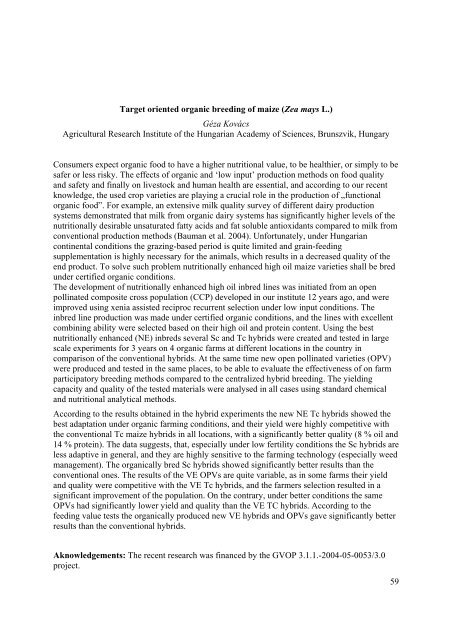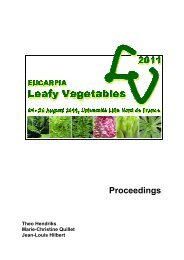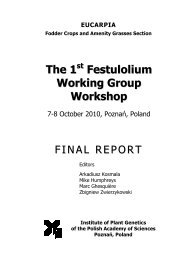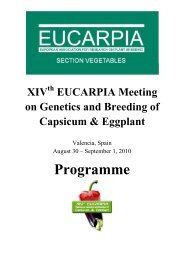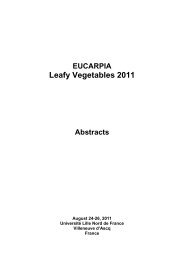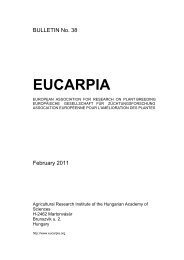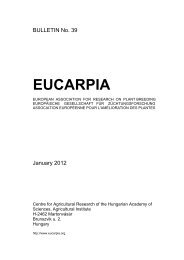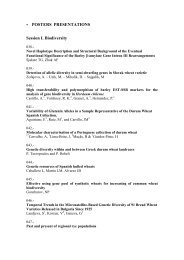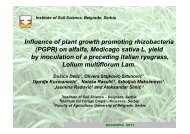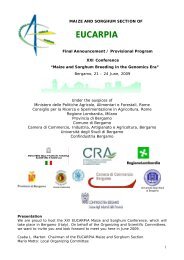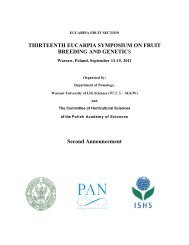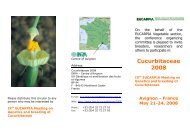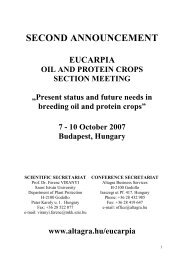Plant breeding for organic and sustainable, low-input agriculture
Plant breeding for organic and sustainable, low-input agriculture
Plant breeding for organic and sustainable, low-input agriculture
Create successful ePaper yourself
Turn your PDF publications into a flip-book with our unique Google optimized e-Paper software.
Target oriented <strong>organic</strong> <strong>breeding</strong> of maize (Zea mays L.)<br />
Géza Kovács<br />
Agricultural Research Institute of the Hungarian Academy of Sciences, Brunszvik, Hungary<br />
Consumers expect <strong>organic</strong> food to have a higher nutritional value, to be healthier, or simply to be<br />
safer or less risky. The effects of <strong>organic</strong> <strong>and</strong> ‘<strong>low</strong> <strong>input</strong>’ production methods on food quality<br />
<strong>and</strong> safety <strong>and</strong> finally on livestock <strong>and</strong> human health are essential, <strong>and</strong> according to our recent<br />
knowledge, the used crop varieties are playing a crucial role in the production of „functional<br />
<strong>organic</strong> food”. For example, an extensive milk quality survey of different dairy production<br />
systems demonstrated that milk from <strong>organic</strong> dairy systems has significantly higher levels of the<br />
nutritionally desirable unsaturated fatty acids <strong>and</strong> fat soluble antioxidants compared to milk from<br />
conventional production methods (Bauman et al. 2004). Un<strong>for</strong>tunately, under Hungarian<br />
continental conditions the grazing-based period is quite limited <strong>and</strong> grain-feeding<br />
supplementation is highly necessary <strong>for</strong> the animals, which results in a decreased quality of the<br />
end product. To solve such problem nutritionally enhanced high oil maize varieties shall be bred<br />
under certified <strong>organic</strong> conditions.<br />
The development of nutritionally enhanced high oil inbred lines was initiated from an open<br />
pollinated composite cross population (CCP) developed in our institute 12 years ago, <strong>and</strong> were<br />
improved using xenia assisted reciproc recurrent selection under <strong>low</strong> <strong>input</strong> conditions. The<br />
inbred line production was made under certified <strong>organic</strong> conditions, <strong>and</strong> the lines with excellent<br />
combining ability were selected based on their high oil <strong>and</strong> protein content. Using the best<br />
nutritionally enhanced (NE) inbreds several Sc <strong>and</strong> Tc hybrids were created <strong>and</strong> tested in large<br />
scale experiments <strong>for</strong> 3 years on 4 <strong>organic</strong> farms at different locations in the country in<br />
comparison of the conventional hybrids. At the same time new open pollinated varieties (OPV)<br />
were produced <strong>and</strong> tested in the same places, to be able to evaluate the effectiveness of on farm<br />
participatory <strong>breeding</strong> methods compared to the centralized hybrid <strong>breeding</strong>. The yielding<br />
capacity <strong>and</strong> quality of the tested materials were analysed in all cases using st<strong>and</strong>ard chemical<br />
<strong>and</strong> nutritional analytical methods.<br />
According to the results obtained in the hybrid experiments the new NE Tc hybrids showed the<br />
best adaptation under <strong>organic</strong> farming conditions, <strong>and</strong> their yield were highly competitive with<br />
the conventional Tc maize hybrids in all locations, with a significantly better quality (8 % oil <strong>and</strong><br />
14 % protein). The data suggests, that, especially under <strong>low</strong> fertility conditions the Sc hybrids are<br />
less adaptive in general, <strong>and</strong> they are highly sensitive to the farming technology (especially weed<br />
management). The <strong>organic</strong>ally bred Sc hybrids showed significantly better results than the<br />
conventional ones. The results of the VE OPVs are quite variable, as in some farms their yield<br />
<strong>and</strong> quality were competitive with the VE Tc hybrids, <strong>and</strong> the farmers selection resulted in a<br />
significant improvement of the population. On the contrary, under better conditions the same<br />
OPVs had significantly <strong>low</strong>er yield <strong>and</strong> quality than the VE TC hybrids. According to the<br />
feeding value tests the <strong>organic</strong>ally produced new VE hybrids <strong>and</strong> OPVs gave significantly better<br />
results than the conventional hybrids.<br />
Aknowledgements: The recent research was financed by the GVOP 3.1.1.-2004-05-0053/3.0<br />
project.<br />
59


